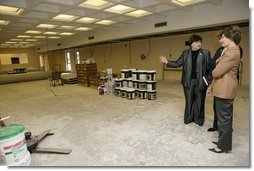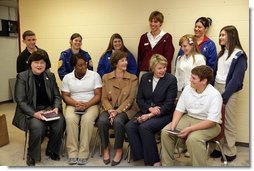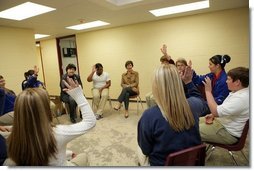
 |
For Immediate Release
Office of the First Lady
January 26, 2006
Mrs. Bush's Remarks after a Visit to St. Bernard Unified School
St. Bernard Unified School
Chalmette, Louisiana
1:22 P.M. CST
MRS. BUSH: Well, we are here today in Louisiana to visit schools specifically. Margaret Spellings, Secretary of Education, is traveling with me, and we just were in a school, a charter school in Algiers, Algiers Charter School, that's up and going. And then, of course, we're here in St. Bernard Parish at this one school where every student who has come back is now housed. And we're seeing really what -- we heard some great stories from students, but we're seeing what can happen when the few people who are left work as hard as they do to start really renewing school.
 And this school, fortunately, had a second floor. We heard the
stories about the people who stayed on the second floor for a week
before they got help during the flood, and how the people who were here
saved people as they came by in boats, or swam up to the second floor of
the school.
And this school, fortunately, had a second floor. We heard the
stories about the people who stayed on the second floor for a week
before they got help during the flood, and how the people who were here
saved people as they came by in boats, or swam up to the second floor of
the school.
As we drove in, we drove from the airport to Algiers, and then drove in this way from there to here. We saw the whole scale of what the destruction is, and I think still people around the country don't realize how huge it is. We're going to go on to Mississippi, where we'll see very similar sights. We'll visit a school there that's open, one of the schools that's open in Mississippi.
But I want people around the country to realize how big the devastation is, how important it is for people around the country to continue to volunteer, to continue to send money to the Katrina fund or other funds of their favorite charities that are working down here, because it's really important for everybody in the United States to stand with the people on the Gulf Coast as they rebuild.
I also want people to know here how discouraging I know it is to see what we saw today, to know how long it's going to take to rebuild, to know how long it's going to take just to rebuild the levees so that people will feel safe enough to come back, to move back. But I also want people to know that the government and the people of the United States are standing with you, that we want people to be able to move back as fast as they can. We know the schools are crucial to that. If schools are open, families can come back. If communities can't get schools open, then it's really, really hard for families to be able to move back.
We hope and we encourage families to make sure your children are in school. Even if you're not yet back in your home district, make sure your children are going to school wherever they are. But if we can provide schools, when communities can provide schools, then children have a chance to go back to live a normal life. And when children are taken care of, then parents feel comfortable in being able to move back and try to rebuild their lives in this community.
So thank you all, thanks for coming out to see us today. If you have specific school questions, Secretary Spellings, of course, can answer those. But I'll be glad to take questions, too.
 Q Mrs. Bush, were you surprised by the lack of progress you've
seen in some of the areas?
Q Mrs. Bush, were you surprised by the lack of progress you've
seen in some of the areas?
MRS. BUSH: Well, I think every part of it is progress. I mean, this is progress when you see here how the cafeteria was opened today, when you see how this school is being rebuilt. I mean, each one of those steps are very important. When you know how long the flood waters stood, how dispersed the citizens are all over the country -- they've move everywhere -- how long it's taken them to get back, really it hasn't been that long. And so the progress is good. But I know it's discouraging to people to still have debris everywhere. There's something about that that's very, very discouraging.
But I want people to know they need to come on back, they need to get to work trying to build. I know that a lot of businesses around here are desperate for workers, and I know it's the same thing -- if they can have schools for their kids and if they think they can find a place to live, or rebuild their own houses, people will come back. I know the people want to be back where they're from.
Every one of the kids that we talked to, they wanted to be here because they wanted to be in St. Bernard's Parish, in their school. They didn't want to be in school in Tennessee, even though they said people were really nice to them there. But they wanted to come home.
Q The President has vowed to help rebuild this area, but this school was rebuilt and reopened with no federal money.
MRS. BUSH: We've discussed that. We've already talked about that.
Q Any response?
MRS. BUSH: Well, I mean, federal dollars have to come here, and they will. There's money through the Department of Education. And I expect that the school will be reimbursed.
MS. VOITIER: Right. We're going through the paperwork now for the reimbursement process, and we feel we'll be successful in securing those funds.
SECRETARY SPELLINGS: The Congress passed the $1.6 billion school aid package just late in December, and on January 5th, the Department of Education, before we counted noses or knew exactly where students were finally settled, sent $100 million to Louisiana immediately. And by February 1st, the count will come in and we will begin the process of reimbursing schools for the expenditures they've made to reopen.
Q Mrs. Bush, you talked about a little bit about the people of this area. What do you say to them? You say that the government is on their side, but some people really don't feel like that. Just this week the White House said no to the Baker bill that could have bailed a lot of people out here. What do you say to those people who are just feeling that the government is not on their side?
 MRS. BUSH: Well, I know that's it's very, very slow. And of
course, that's how government always is. It's bureaucratic and it's
slow to -- for instance, the Congress had to appropriate the money for
the schools, and then the Education Department did disburse it quickly.
MRS. BUSH: Well, I know that's it's very, very slow. And of
course, that's how government always is. It's bureaucratic and it's
slow to -- for instance, the Congress had to appropriate the money for
the schools, and then the Education Department did disburse it quickly.
But there was money yesterday that was announced for Community Development Block Grants, which states can use just like the Baker bill proposed. Once states write their plans for how they want to use Community Block Development money, they can start that out. And if they want to do what was in the Baker bill, which was to buy out areas, they can write that in their proposals for their Community Block Grants.
It takes a plan, and that's the really hard work. Your temptation is just to throw your arms up and say, this just looks like too much work. And you might have thought that. But you didn't. And you went to work, even though there was not FEMA money yet. And this is where you are, after just really a few months of devastation.
So it's really important for local people, for local officials, for state officials to work as hard as you can, to meet with your community, to see what your needs are, to draw out your plans that you want, and then to access the federal money. And there is federal money. I think yesterday it was $6.2 billion for Louisiana, and approximately a little over $5 billion for Mississippi, for Community Block Grants, that sort of money that the Baker bill proposed.
So once states really figure out either are our neighborhoods safe -- we don't want people to move back until neighborhoods are safe. We want to make sure the levees are safe. We want to make sure any runoff or debris that make a site unsafe is removed. But at that point, we want people to come home.
Q What do you plan to tell the President when you get back?
MRS. BUSH: Well, I'll tell him -- he knows, believe me, he knows. He's briefed on the Gulf Coast almost every single day. He's been here a lot, as you know. He was here last week. But I'm going to tell him what I see is the courage of people that live here. And people here are solid as rocks. And they want to be at home and they want to rebuild their homes. These kids wanted to be at this school because they wanted to rebuild their school. And they're on the front lines, really, of the rebuilding, because they came back so early that none of this part of the building is finished. But I'm encouraged, I really am.
And the other thing that's difficult is -- imagine, one little girl I met left with her family, and her dad was missing for three weeks. I mean, she found him and he was okay, but for three weeks she didn't know where her dad was. So you can imagine the emotional trauma and the grief that families are going through because they lost everything they had. It will be slow, but I know it will happen.
Thanks, everybody. Thanks a lot.
END 1:33 P.M. CST